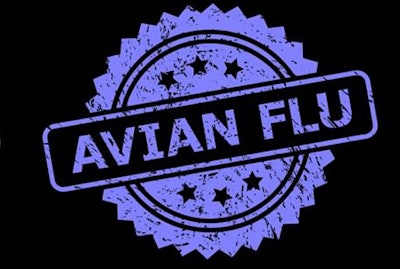
In France, measures to control the spread of highly pathogenic avian influenza (HPAI) now include the mandatory housing of all poultry across the country.
Meanwhile, the government in the United Kingdom has announced some support for the commercial poultry sector, which has been hard hit by a rapid spread of the virus over the past two months. Elsewhere in Europe, first cases of HPAI this season have been reported in Austria, Denmark and Hungary, as well as further regions of Germany and Italy.
One week ago, the agriculture ministry of France raised the alert level for HPAI across mainland France to “high.” This follows a continuing and widespread increase in outbreaks across the country.
Among the measures related to this ramping up of control measures is a mandatory housing order for all poultry nationwide from November 11. Furthermore, gatherings with poultry such as shows are banned, and waterfowl must be transported in covered vehicles when they are three days of age or older. Restrictions are now in place for hunting, and racing of pigeons is prohibited until April of 2023. At zoos where housing is not possible, birds must be vaccinated.
As of November 8, the ministry puts the number of outbreaks in commercial poultry across the French mainland at 48 since the start of the new disease season on August 1. This represents an increase of eight outbreaks since the previous update dated October 28.
With the first cases confirmed in Deux-Sèvres and Indre, outbreaks on farms have been reported in 18 departments over the past three months.
Over the same period, captive birds including backyard poultry, zoos etc. have tested positive for the HPAI virus at 45 locations across the French mainland. They bring to 29 the number of departments registering cases since the start of August, and include the first cases in the southern region of Occitanie.
Government support for HPAI-hit U.K. farms
Following the deteriorating HPAI situation across the United Kingdom (U.K.) - particularly England - the agriculture department Defra has announced additional support for farmers whose flocks contract the infection. New measures involve quicker compensation payments, and support for business planning.
Firstly, compensation payments to affected farmers will be made at the start of the culling period, rather than at the end as previously. The payments better reflect the impact of outbreaks, according to Defra, and ease pressures over business cash flow.
Furthermore, for England, marketing rules will be eased, which will benefit producers of turkeys, geese, and ducks ahead of the peak Christmas season. Farmers of these poultry will have the option to slaughter their birds early and store the products frozen. These can be defrosted and sold to consumers between November 28 and December 31.
Since the start of the 2022-2023 season in October, HPAI outbreaks linked to the H5N1 virus serotype have increased to 198 across Great Britain, according to Defra (as of November 11).
Since November 7, a mandatory housing order has been in place across England, covering commercial poultry and captive birds.
Overview of outbreaks in Europe's commercial poultry
As of November 5, 1,936 HPAI outbreaks have been recorded in commercial poultry flocks across Europe so far this year.
This is based on the latest update of the Animal Disease Information System by the European Commission (EC). To date, one or more outbreaks have occurred in 22 countries covered by the EC since the start of 2022.
With two more months of 2022 ahead, this year’s total well exceeds the 1,756 outbreaks registered with the EC by 24 European states for the whole of last year.
This year, mainland France has reported the most HPAI outbreaks in poultry to the EC (1,392). Next come Hungary (207), Germany (79), and the Netherlands (75).
First cases reported in Danish poultry
Over the past week, seven European countries have officially registered new HPAI outbreaks in poultry.
From Denmark came notification of the nation’s first cases of HPAI since February. Following a spike in mortality, the H5N1 virus was detected at a commercial farm with meat turkeys in Slagelse, according to the report to the World Organisation for Animal Health (WOAH).
The municipality is on the western coast of the island of Zealand. Source of the infection is unknown.
Further outbreaks on other farms in Europe
Registering the highest number of new outbreaks with WOAH has been the U.K. Infections were confirmed at 20 commercial premises in the period October 21-30, directly impacting almost 524,000 poultry. Since that date, Defra has confirmed a further 11 outbreaks on farms.
Meanwhile, Germany has confirmed with WOAH a further 13 new outbreaks. One of these was detected at a slaughterhouse, while other cases were on farms in Schleswig-Holstein, North-Rhine Westphalia, and Lower Saxony. These states are in the north and west of the country.
Furthermore, the national veterinary reference laboratory, Friedrich-Loeffler Institute has reported the first detection of the H5N1 HPAI virus for this season in domestic birds in the states of Rhineland Palatinate (in the west of the country), and Hesse in central Germany.
In Italy, the number of this season’s HPAI outbreaks in poultry has risen to 19, according to Italian health authority and research organization for animal health and food safety, IZSVe (as of November 11). The total comprises 13 farms and six backyard flocks in the regions of Veneto, Lombardy, and Emilia-Romagna, as well as the first cases of the autumn/fall in Friuli-Venezia Giulia.
To WOAH, the authorities in France have reported six new outbreaks in commercial poultry. Each involving flocks of 6,000-76,000 birds, these confirmed cases began on October 25-29.
In two southern counties of Hungary, the first cases of HPAI have been recorded since June of this year. Poultry have tested positive for the H5N1 virus serotype at two farms in each of Bacs-Kiskun and Csongrad-Csanad.
In the Netherlands, the agriculture ministry reports one further HPAI outbreak at a commercial premises. Affected were 46,000 broiler breeders in the southern province of North Brabant.
More outbreaks in Europe’s backyard flocks, captive birds
In its reporting system, the EC has recently introduced a separate category for HPAI outbreaks in captive birds. Covering non-commercial poultry flocks, zoos, and similar premises, this year’s total stands at 178 (as of November 11).
With 81 so far this year, France leads the region’s nations for this type of outbreak, followed by the Netherlands (45), Belgium (12), and Germany (10). Each of the 13 other countries reporting cases in this category in 2022 has registered no more than seven outbreaks.
Since October 28, France, Germany and the Netherlands have each registered one new outbreak in backyard/captive birds with the EC.
With WOAH, the veterinary authority of Austria has registered the country’s first cases of H5N1 HPAI in poultry this season. Testing positive for the virus was a backyard flock near the city of Graz in the southwestern state of Styria.
Not covered by the EC system, the U.K. has registered four new outbreaks in captive birds to WOAH over the past week.
Further positive cases in European wild birds
For the year to November 4, a total of 2,891 HPAI outbreaks in wild birds have been reported to the EC. One or more outbreaks have now been confirmed in 32 European states in 2022.
Of the total, 1,160 outbreaks have been reported by Germany, followed by the Netherlands (616) and France (250).
Since October 28, total cases have also increased for Belgium, Denmark, and Spain.
For comparison, the EC disease system recorded a total of 2,437 HPAI outbreaks in captive and wild birds in 31 European states during the whole of 2021.
Over the past week, four further countries have reported to WOAH new cases of HPAI in wild birds. These include the U.K. (128 new cases), North Macedonia (75), the Republic of Ireland (five), and Serbia (one).
For all the outbreaks above, presence has been confirmed of the H5N1 HPAI virus serotype.
In the U.K., the disease situation with respect to the H5N8 HPAI virus variant is now closed. According to WOAH notifications, a single wild bird tested positive for this variant in November of last year.
View our continuing coverage of the global avian influenza situation.

















